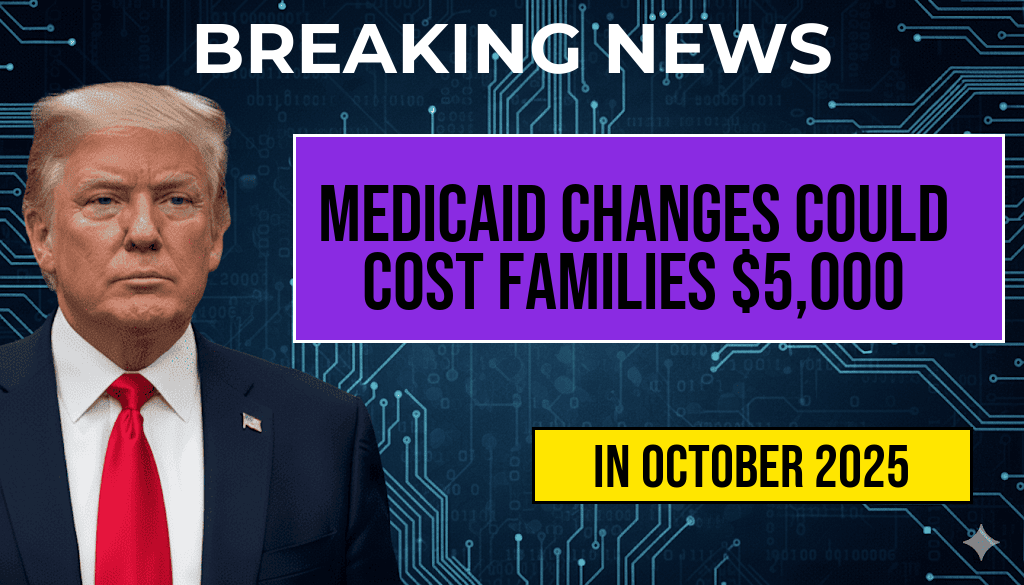The recent changes to Medicaid are raising concerns among families across the United States, as experts predict that some households could face annual out-of-pocket medical costs exceeding $5,000. These modifications, which include adjustments in eligibility requirements and coverage options, are part of broader efforts to streamline the program but may inadvertently burden low- and middle-income families. As states implement these new rules, the financial implications could be severe for those already struggling to afford healthcare. With millions relying on Medicaid for essential services, the potential for increased costs is igniting a debate about the program’s future and its impact on vulnerable populations.
Understanding the Medicaid Changes
Medicaid, a crucial program providing healthcare coverage to over 82 million Americans, has undergone significant changes that have begun to take effect. While these alterations aim to improve efficiency and reduce fraud, they have also led to concerns about the accessibility of affordable healthcare for many families.
Key Changes in Medicaid
- Eligibility Adjustments: As states reassess who qualifies for Medicaid, some families may find themselves ineligible for coverage they previously had.
- Coverage Limitations: Certain services that were once covered may now have restricted access, compelling families to pay out-of-pocket for necessary treatments.
- Increased Premiums: Some states are implementing higher premiums, making it more difficult for low-income families to afford care.
Projected Financial Impact on Families
The changes are expected to have a profound financial impact on families, with estimates suggesting that out-of-pocket costs could rise significantly. A recent analysis indicated that families could see their annual medical expenses increase by more than $5,000, leading to challenges in budgeting for essential healthcare services.
Factors Contributing to Increased Costs
| Factor | Impact |
|---|---|
| Loss of Coverage | Families may have to seek alternative, often more expensive, insurance plans. |
| High Deductibles | Higher deductibles mean families must pay more before insurance coverage kicks in. |
| Limited Provider Networks | Restricted access to healthcare providers can lead to increased travel and treatment costs. |
Expert Opinions on the Changes
Healthcare experts warn that the changes to Medicaid could exacerbate existing inequalities in the healthcare system. Dr. Emily Carter, a health policy analyst at the Urban Institute, stated, “The modifications might simplify some aspects of Medicaid, but they risk leaving many families in a precarious position. The financial burden could lead to delays in seeking care, ultimately worsening health outcomes.”
Impact on Vulnerable Populations
The effects of these changes are especially concerning for vulnerable populations, including children, the elderly, and those with chronic health conditions. Many low-income families rely on Medicaid not only for basic medical care but also for preventive services that can mitigate more severe health issues down the line.
Looking Ahead: What Families Can Do
As families navigate these changes, there are steps they can take to prepare for the potential financial impact:
- Review Coverage Options: Families should thoroughly assess their current healthcare coverage and explore alternative options if necessary.
- Budget for Medical Expenses: Setting aside funds for potential out-of-pocket costs can help alleviate financial strain.
- Stay Informed: Keeping up to date with policy changes and available resources can empower families to make informed decisions about their healthcare.
For more information on Medicaid and its changes, families can visit Medicaid.gov or read about the impact on healthcare costs at Forbes Healthcare Costs.
As the landscape of Medicaid continues to evolve, understanding these changes and their implications is vital for families relying on this critical program. The financial burden of increased out-of-pocket costs could reshape how families access healthcare, highlighting the need for ongoing dialogue and advocacy for equitable health solutions.
Frequently Asked Questions
What are the recent changes to Medicaid that could affect families?
The recent changes to Medicaid include adjustments in eligibility and coverage that may result in increased out-of-pocket medical costs for families, potentially exceeding $5,000 annually.
How can families prepare for the potential increase in medical costs?
Families can prepare by reviewing their Medicaid eligibility, exploring alternative health insurance options, and budgeting for increased out-of-pocket expenses that may arise due to these changes.
Who will be most affected by the changes to Medicaid?
Low-income families, individuals with chronic illnesses, and those who rely heavily on Medicaid for their healthcare needs are likely to be the most affected by these changes, leading to higher medical costs.
What steps can families take to minimize out-of-pocket expenses?
To minimize out-of-pocket expenses, families should consider preventive care, seek assistance in understanding Medicaid options, and utilize community resources that may provide support or additional coverage.
Are there any resources available for families struggling with medical expenses?
Yes, families can access various resources such as local healthcare organizations, non-profits, and government programs that offer assistance in managing medical expenses and navigating Medicaid changes.






